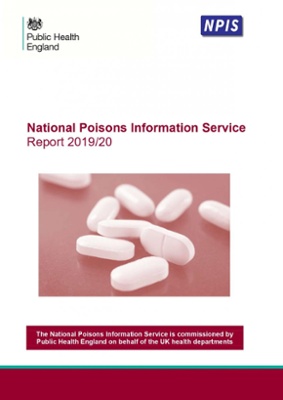National Poisons Information Service Annual Report, 2019-2020
 The National Poisons Information Service (NPIS) is commissioned to provide information and advice 24-hours a day to NHS healthcare professionals across the UK to support the management of patients with suspected poisoning. Recently the NPIS published their annual report summarising their activities for the period 2019-20.
The National Poisons Information Service (NPIS) is commissioned to provide information and advice 24-hours a day to NHS healthcare professionals across the UK to support the management of patients with suspected poisoning. Recently the NPIS published their annual report summarising their activities for the period 2019-20.
Overall, the NPIS Annual Report 2019-20 highlights the breadth and importance of delivering a high quality poisons service despite ever-increasing financial pressures. During 2019–2020, there were just over 38,000 telephone enquiries to NPIS nationally, and almost 686,000 TOXBASE® user sessions – mainly from hospital departments and NHS advice services (i.e. NHS 111, NHS 24 and NHS Direct). At the end of March 2020, there were also close to 19,000 subscribers to the TOXBASE® app, who accessed about 225,000 app pages (representing a 18% increase in subscribers, and 47% increase in app usage, respectively, from 2018-19).
A number of issues of current toxicological concern are highlighted in the 2019/20 NPIS Annual Report, including the impact of COVID-19, trends in enquires relating to drugs of abuse, and the toxicity of 2,4-dinitrophenol (DNP):
- COVID-19 has impacted every workplace, including the NPIS. As a result, NPIS has put in place procedures to facilitate homeworking, amended its’ criteria for referring patients to hospital to help protect those vulnerable to COVID-19, and is collaborating with WHO to undertake toxico-surveillance of agents (e.g. hand sanitizers, disinfectants, bleach) that may have been used to guard against or treat COVID-19. This work is on-going and due to report in 2021.
- Cocaine was the most frequent drug of abuse involved in telephone enquiries/TOXBASE® accesses, followed by cannabis, MDMA (including ecstasy), and heroin, which is a similar pattern to 2018/19. There has also been a substantial rise in activity relating to methamfetamine over previous years, alongside a continuing decline in enquiries and TOXBASE accesses relating to novel pyschoactive substances.
- 2,4-dinitrophenol is an industrial chemical sometimes used as a weight loss preparation or in body building and has been of particular concern in recent years due to the high risk of life-threatening toxicity developing with its’ use. During 2019/20 there were 15 cases of DNP exposure discussed with NPIS of which five (30%) were fatal – highlighting the very high toxicity of DNP. The NPIS is continuing to monitor DNP exposures and work with other Government agencies to prevent harm from this highly toxic chemical.
Further information about the NPIS Annual Report 2019–2020 can be found on the NPIS website.